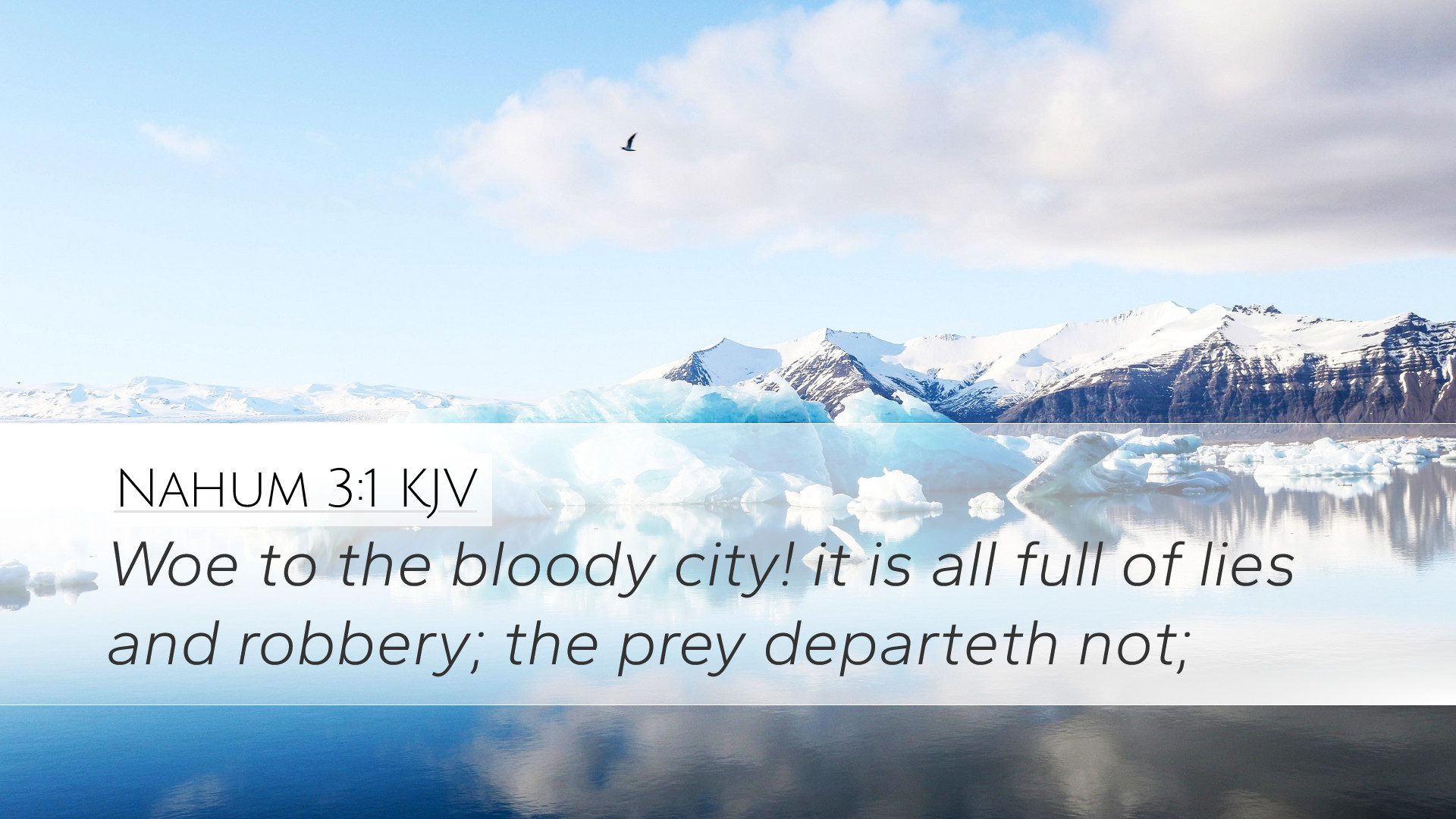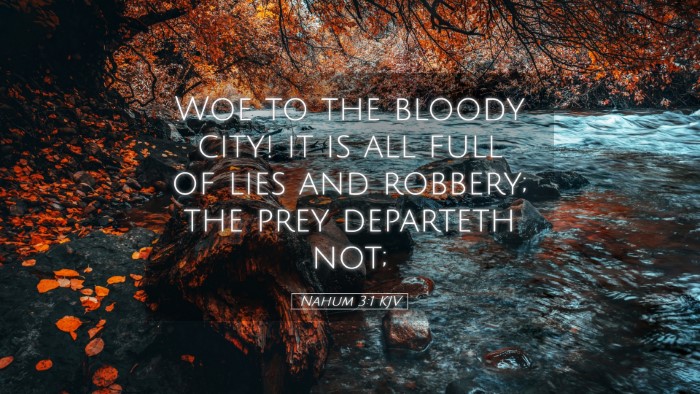Old Testament
Genesis Exodus Leviticus Numbers Deuteronomy Joshua Judges Ruth 1 Samuel 2 Samuel 1 Kings 2 Kings 1 Chronicles 2 Chronicles Ezra Nehemiah Esther Job Psalms Proverbs Ecclesiastes Song of Solomon Isaiah Jeremiah Lamentations Ezekiel Daniel Hosea Joel Amos Obadiah Jonah Micah Nahum Habakkuk Zephaniah Haggai Zechariah MalachiNahum 3:1
Nahum 3:1 KJV
Woe to the bloody city! it is all full of lies and robbery; the prey departeth not;
Nahum 3:1 Bible Commentary
Commentary on Nahum 3:1
Introduction
Nahum 3:1 presents a powerful and evocative proclamation concerning the fall of Nineveh, the capital of the Assyrian Empire. Through this verse, the prophet Nahum delivers a sweeping condemnation of the city's violence, deception, and moral decay. The weight of his message serves not only as a judgment upon Nineveh but also as a profound lesson for all nations regarding the consequences of sin and evil.
Text of Nahum 3:1 (KJV)
"Woe to the bloody city! it is all full of lies and robbery; the prey departeth not."
Analysis and Insights
Historical Context
To fully grasp the weight of Nahum’s message, it is essential to consider the historical and geopolitical context of Assyria during the 7th century B.C. Nineveh, renowned for its grandeur and wealth, was also notorious for its brutality and oppression. The Assyrians had instigated fear throughout the region, marked by their imperial conquests and cruel treatment of subjugated peoples. Nahum’s prophecy comes as a denunciation of this tyranny.
Structure and Language
Nahum employs vivid language and a sharp invective style to convey his message. The term "woe" serves as a prophetic interjection that indicates impending doom and sets the tone for his lament. The exclamation targets Nineveh, rendering it not merely as a geographical location but as the embodiment of lawlessness and sin.
The "Bloody City"
The phrase "bloody city" characterizes Nineveh's violent nature. According to Matthew Henry, this reflects the bloodshed that characterized the city’s interactions, not only in warfare but also in the internal oppression of its own populace. Assyrian records boast of their military conquests, often detailing barbaric acts committed against their enemies. Nahum’s labeling of Nineveh as "bloody" echoes the sentiment of other prophetic texts that highlight God’s judgment against nations whose practices are steeped in violence (Isaiah 59:3, Micah 3:10).
Full of Lies and Robbery
Next, Nahum describes Nineveh as being "full of lies and robbery." Albert Barnes emphasizes that deception permeated the fibers of Nineveh’s society—a society characterized by treachery, falsehood, and dishonesty. Robbery here refers not just to thievery but to a systematic exploitation of the vulnerable. The dual indictment of lying and stealing underscores a broader moral failure. Adam Clarke notes that the fabric of the Assyrian empire was woven through deceitful diplomacy and immoral economic practices that ultimately contributed to its downfall.
The Prey Departeth Not
The concluding clause, "the prey departeth not," portrays an unrelenting cycle of oppression within Nineveh. This expression suggests a ravenous appetite for power and control, with victims unable to escape the clutches of their oppressors. In the light of this, theological scholars interpret "the prey" not only as the Assyrian captives but also as a metaphor for nations that fall into the hands of those who employ ruthless tactics for advancement. This commentary aligns with biblical themes of divine justice, wherein God observes the plight of the marginalized and responds with wrath against injustice.
Theological Implications
Nahum’s prophecy serves as a stark reminder of divine retribution against a nation that engages in inhuman practices. The theological implications are manifold:
- Divine Justice: Nahum definitively illustrates that God does not overlook systemic violence and immorality. The fate of Nineveh reflects God’s ultimate plan for justice.
- Warning to the Nations: The imagery of a "bloody city" serves to warn other nations of the potential outcomes of similar behaviors, illustrating a universal principle that applies to all societies across time.
- Hope for the Oppressed: For the oppressed and downtrodden, Nahum’s declaration signals hope. God hears the cries of the victims and stands against their oppressors, offering assurance that He will act on behalf of the wronged.
Conclusion
In Nahum 3:1, we encounter a solemn reminder of moral accountability that extends beyond geographical borders and chronological restraints. For pastors, students, and scholars, there exists a rich tapestry of applications found within this singular verse. The lessons gleaned from Nahum call upon individuals, congregations, and nations to reflect on their collective ethical responsibilities. Violence, deceit, and exploitation are not without consequence; each person and institution stands under the scrutiny of divine justice.
Let the prophetic words of Nahum compel us to advocate for righteousness and justice in our contemporary contexts. The cry against Nineveh is an enduring call to uphold integrity, embody truth, and champion the cause of the oppressed in every era.


